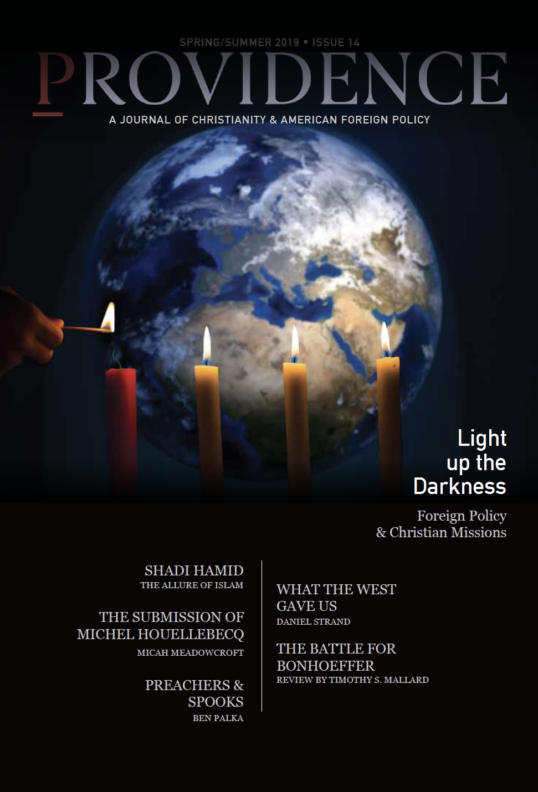Perhaps one of my favorite tools in teaching Western civilization to undergrads at Arizona State University is to show clips of the masterpiece historical satires Monty Python’s Life of Brian and Monty Python and the Holy Grail. Besides being brilliantly hilarious and at times deeply offensive—the closing scene to Brian is just awful, awful, awful—Monty Python manages to drive home some extremely important points about the complex and compelling nature of Western history.
When I teach about the Roman Empire, I show the students a scene from Brian where Jewish Zealots plot to kidnap and extort money from the Roman governor of Judea. As they go over their plans and recount the history of Roman exploitation and oppression, the leader of the group, John Cleese’s character, denounces the Romans, “And what have they ever given us in return?!” After a second or two of grumbling agreement, one of his compatriots unexpectantly answers his rhetorical question, “The aqueduct.” Cleese responds a bit sheepishly, “Oh, yeah, they did give us that.” A second member of the group adds, “Sanitation.” To which one of the leaders agrees, “Oh yeah, Rich, remember what the city used to be like.” A third member pipes, “The roads!!” Cleese’s character responds, incredulously, “Oh yeah, obviously the roads. The roads go without saying.”
The skit continues this way for a while with other would-be revolutionaries chiming in with other benefits of Roman rule—wine, public health, education, medicine, public order, and so on. The seeming paradoxes are hilarious and illuminating. Here we have Jewish revolutionaries looking to topple the Roman government recognizing that many of things that have made their lives inestimably better have been brought to them by that very despotic and oppressive government. This is how Western history actually goes. It’s messy, ambiguous, brutal, and marvelous all at the same time.
The semi-ridiculous conversation that ensued after Trump’s Poland speech about “Western civilization” reflected an equally narrow and reductive view of the West that was indebted more to each side’s contemporary biases than actual history. Western civilization was a narrow and bigoted dog-whistle to white nationalists, the commentariat bemoaned. Or it was freedom and free markets, which could be inclusive of other cultures and civilizations. Trump took a more gauzy view of the West, playing up its greatness and uniqueness. Many of these writers, defenders and critics alike, failed to notice that Western civilization is more complicated, ambiguous, fraught, and glorious than they appreciated.
This is why I turn to Monty Python movies with my students. Not only does comedy get us to put down our guards and come out of our little culture-war foxholes, but it also communicates something that direct factual assertions miss. Western civilization is not one thing, and its effects range from epically fantastic to frighteningly barbaric. Our current political divisions get projected backward onto a history and culture that defies our tribal identities and positions. Both sides in this debate are right, but not completely. Our triumphs are more amazing and astounding, and our failures worse and more sickening than we know.
What our moralistic defenses of Western civilization miss, and its critics get right, is that there is a dark side to societies and political systems that sprang from Greek and Roman soil in Western Europe and North America. But it’s much worse than the critics seem to appreciate. Violence and brutality have been the hallmark of the West, but so have they defined the history of much of the world. That’s the norm, not the exception.
We don’t need to rehearse the list, but surely the death and destruction of the twentieth century should give us more than a little cause for worry and poke holes in our overly confident views of progress and triumphalism. If we reviewed Western history century by century, we would find cruelty and evil lurking everywhere. The Romans were vicious and brutal in their conquests and suppression of local populations and their own people (see the Social War and Servile Wars). The Greeks were not much better. The early medieval period was a violent and brutal struggle for life amongst the peasantry. The High Middle Ages were turbulent and bloody. The Thirty Years’ War engulfed most of Europe in a long and bloody conflict that was essentially pointless. Voltaire is not far off the mark when he writes his rejoinder to Jean Jacques Rousseau “that history in general is a collection of crimes, follies, and misfortunes.”
But these same cultures produced incredibly humane and compassionate societies that have become deeply concerned about the mistreatment of women and minorities. Care for the poor and the outcast, as historian Peter Brown has shown, became shared social concerns through the advocacy of Christian bishops in the late empire. The development of Roman law, its systemization in the Justinian Code, and revival and complexification in Canon Law and secular law codes in the eleventh and twelfth centuries are astounding feats. We could elaborate on the development of the modern nation-state, the complex political systems that secure liberty and equality before the law for ever more people. Then there are the astonishing scientific developments, both theoretical and practical, that continue apace to this day. Alongside these, we have the development of ever more sophisticated economies that develop means of production and trade that largely benefit the poor and a growing middle class. The abolition of the transatlantic slave trade was brought to you by…the British Empire! Not exactly the counter-imperial narrative that one hears so often in the corridors of the modern university. Eventually, the United States ended its slavery through a bloody civil war, and though the road to full racial equality has been fraught, the vast majority of Americans desire a free and equal society for all peoples.
Learning from our past mistakes is a crucial part of any society that hopes to move beyond its past failures. It’s the same for persons. We do not grow unless we learn from our mistakes. But what should astound us even more is the progress we have made. Too many today imagine that modern day America is some sort of racist, kleptocratic dystopia. If only they knew where we have come from! And yet, there are many things that were done better in the past. Not everything about our contemporary Western world is right or can be set right. Societies are imperfectible, and more often than not, those who deny that and seek to create utopias on earth end up creating hell.
What we miss in these simple readings of history is the both/and of history. Moralism skews our reading of the past. Rome was both grotesquely brutal and staggeringly brilliant. What the Romans managed to achieve should leave us in sheer awe, but so should their failures. In fact, that is exactly how human societies work. The British Empire had its fair share of evils that it perpetrated on the world, and yet this same empire ended the transatlantic slave trade, almost singlehandedly, and passed along political systems that have made many of its former colonies successful, prosperous democracies. To make that statement is scandalous in the eyes of many today, but that’s because we have a hard time holding two competing ideas together at the same time: societies and cultures can be both wonderful and flawed at the same time. America was a country founded on liberty and equality that denied both to a significant portion of the population. That does not make America a racist country, but a very human one, filled with great promise, peril, and contradictions all around.
Our desire for the perfect society is an admirable one, but we should not expect it. Instead, we should always expect that our societies will be all too human—a mixture of triumph, tragedy, and ambiguity all rolled into one. The West, for all of its darkness and tragedy, is also a story of amazing cultural, political, and social achievement that should make us both sober and proud at the same time.








 Live in the DC area? Sign-up for Providence's in-person events list!
Live in the DC area? Sign-up for Providence's in-person events list!